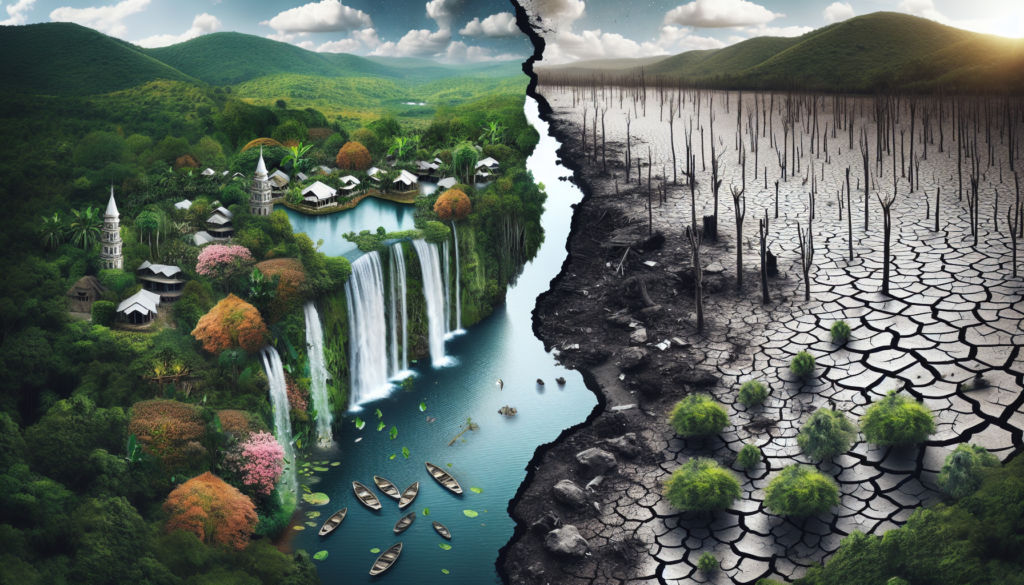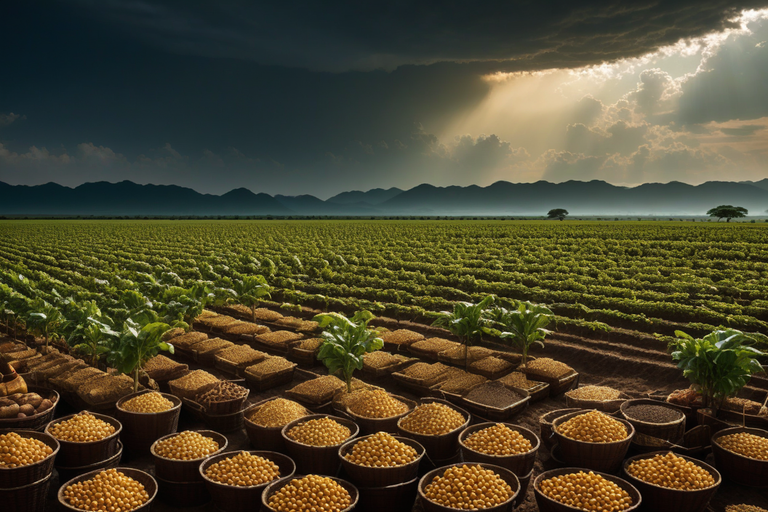Table of Contents
- Climate Change and Agriculture
- How Climate Change is Threatening our Food Security
- Food Security and Access
- Sustainable Solutions
- Final Thoughts
Hey there, curious minds! Today, we’re diving into a crucial topic that affects every one of us – the impact of climate change on food security. It’s a serious issue that’s not just a threat to the future but a present reality already reshaping our food systems. Let’s break it down and explore the critical intersection of climate change and food security.
“The food system is ground zero for climate change. It’s both a victim and a contributor. But it’s also a solution. By transforming our food system, we can mitigate climate change, build resilience, and nourish a healthier planet and people.” – Christina Figueres, Former Executive Secretary of the UN Framework Convention on Climate Change.
This quote emphasizes the food system’s dual role in contributing to and being impacted by climate change. It also offers a hopeful message about its potential as a solution through systemic transformation.
Climate Change and Agriculture
Picture this: rising temperatures, unpredictable weather patterns, and extreme events like droughts and floods. These are not just elements of a doomsday scenario – they’re the new normal for farmers worldwide. As climate change continues to wreak havoc, agricultural production is being significantly altered. Crop yields are dropping, livestock are struggling to thrive, and fisheries are facing new challenges. It’s a tough time to be a farmer, with the pressure mounting to adapt to the ever-changing conditions.
How Climate Change is Threatening our Food Security
Harvesting hope, how climate change is threatening our food security. Take the case of coffee, for instance. Coffee is the lifeblood of morning routines around the globe, but it’s also a crop in crisis. In the highlands of Central America, rising temperatures are creating a paradise for coffee rust, a fungus that ravages coffee plantations. The result? A decline in coffee production threatens the livelihoods of millions of farmers and potentially makes your daily cup of joe a luxury item.
Now, consider the humble potato. In the Andean highlands of Peru, where potatoes have thrived for thousands of years, unpredictable weather patterns are causing havoc. Droughts, frosts, and pests, exacerbated by climate change, are forcing farmers to abandon traditional varieties. The potato, a staple food for many, is under threat.
The story is the same for rice farmers in Asia. Rising sea levels are causing saltwater to infiltrate paddy fields, rendering the soil too salty for rice cultivation. This is a disaster for a continent where rice is a dietary mainstay for billions. And it’s not just crops.
Climate change is also affecting livestock. In Australia, heat stress is causing a decline in dairy and beef production. Cattle can’t cope with the rising temperatures, and the quality and quantity of their milk and meat suffer. But it’s not all doom and gloom.
There’s hope on the horizon. Farmers are adapting, innovating, and fighting back. In the coffee fields of Central America, researchers are developing rust-resistant varieties.
In Peru, farmers are cultivating hardy, drought-resistant potato strains. In Asia, scientists are breeding salt-tolerant rice varieties.
And in Australia, farmers are adopting sustainable farming practices.
These are steps in the right direction, but we must do more. We need to reduce greenhouse gas emissions. We need to invest in renewable energy. We need to stop deforestation. We need to adopt plant based diets. We need to support sustainable farming practices. And we need to rethink our food systems. The clock is ticking. Climate change isn’t waiting. Our food security hangs in the balance. But there is still time to change the narrative. It’s still possible to ensure a future where our favorite foods are still on the menu.
So, what will you do? Will you stand by and watch as our food security crumbles? Or will you take action? Will you make a difference? The choice is yours. The future of our food is in your hands.
Food Security and Access
Now, let’s talk about the ripple effect of climate change on food security. Shifts in the environment directly impact the food we put on our tables. Reduced harvests, dwindling resources, and disrupted supply chains contribute to growing food insecurity. And here’s the kicker – those hit the hardest are often the most vulnerable. Low-income communities and developing countries bear the brunt of food scarcity and hunger, amplifying existing inequalities. It’s a stark reminder of the disparities in our global food system.
Climate change is not just about rising temperatures; it’s about food security and our future. 🌱 Let’s work together to harvest hope and protect our planet for future generations.
Read more about Climate change #climatechange #foodsecurity #harvestinghope
“Climate change is not just about melting glaciers and rising sea levels. It’s about empty plates and hungry children. It’s a matter of life and death for millions of people already facing food insecurity today, and for billions more who will be impacted in the years to come.” – Ban Ki-moon, Former Secretary-General of the United Nations
This quote highlights the real-world human consequences of climate change on food security, particularly for vulnerable populations.

The grass is always greener on the other… oh wait.
Sustainable Solutions
But fear not – there’s hope on the horizon. Amidst the challenges posed by climate change, there’s a growing movement towards sustainable solutions that could help safeguard our food security. We can work towards a more sustainable agricultural future by embracing practices that promote resilience and resource conservation. From regenerative farming techniques to investing in climate-resilient crops, there are ways to mitigate the impacts of climate change on our food systems. It’s a journey towards a greener, more resilient food future.
“We cannot talk about food security without talking about climate change. We cannot talk about climate change without talking about agriculture. These issues are inextricably linked.” – The World Bank
This quote underscores the fundamental interconnectedness of these challenges, emphasizing the need for a holistic approach to address them.
Final Thoughts
As we wrap up our exploration of the impact of climate change on food security, it’s clear that the stakes are high. Our food systems face unprecedented challenges, but we can pave the way for a more secure future with awareness and action. It’s up to all of us – individuals, communities, and policymakers – to prioritize food security in the face of climate change. By working together and embracing sustainable solutions, we can cultivate a future where food security is a reality for all. So, let’s roll up our sleeves, plant the seeds of change, and harvest hope for a brighter tomorrow.







In the face of climate change, our food security is at risk as extreme weather events and shifting growing conditions threaten crop yields globally. The interconnected relationship between Mother Earth and our food systems has never been more crucial to understand. While the challenges ahead seem daunting, there is hope in transitioning to a plant-based diet that prioritizes wellness for both ourselves and the planet.
Embracing a plant-based diet not only reduces our carbon footprint but also promotes sustainable agricultural practices that can help mitigate the impacts of climate change on our food supply. By supporting local farmers who prioritize biodiversity and resilience in their crops, we can harvest hope for a future where access to nutritious and abundant food is not compromised by environmental threats. It’s time to recognize the power we hold as individuals to make choices that nourish both ourselves and the planet, creating a brighter future for generations to come.
Climate change poses significant threats to our food security. Rising temperatures, changing rainfall patterns, and extreme weather events such as droughts, floods, and storms can have detrimental effects on agricultural production.
It is crucial to address climate change and implement sustainable agricultural practices to mitigate these threats to our food security. This includes promoting climate-resilient farming techniques, investing in research and development, and adopting sustainable land management practices.